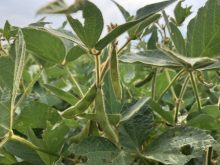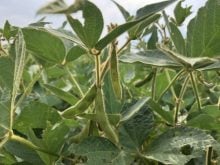Chicago | Reuters — The U.S. Environmental Protection Agency said on Monday that farmers can use existing supplies of a herbicide linked to crop damage, after a federal court blocked sales and use of the product last week.
The EPA said farmers have until July 31 to use supplies of dicamba-based herbicides that they had on hand as of Wednesday last week. The products, sold by Bayer and rivals, are known to drift away and damage crops that are not resistant to the chemical.
A three-judge panel of the Ninth U.S. Circuit Court of Appeals ruled on Wednesday that the EPA had substantially understated the risks related to the use of the herbicides, which are sprayed on genetically engineered soybeans and cotton.
Read Also

Prairie Wheat Weekly: Most Western Canadian bids higher
Western Canadian wheat prices were higher on Oct. 16, 2025 compared to the past week.
The decision confused farmers who bought herbicides months ago as they wrap up planting in the U.S., the world’s No. 2 soybean exporter. Different responses to the decision from states subsequently created an uneven playing field for growers.
“EPA’s order will mitigate some of the devastating economic consequences of the court’s decision for growers,” the EPA said in a statement.
About 60 per cent of the U.S. soybean crop this year is expected to be seeded with Bayer’s dicamba-resistant Xtend soybeans, according to Bayer. They need to be sprayed with the herbicide to ward off weeds that have developed a tolerance for glyphosate.
Several farm states said after the court decision that they would allow dicamba spraying as they waited for guidance from the EPA. Plaintiffs in the court case against the EPA, which include environmental and public-interest groups, had urged the agency to immediately tell states that it was illegal to use the dicamba herbicides.
“Today’s disingenuous order from the EPA flies in the face of the court decision holding these pesticides unlawful,” attorneys for the plaintiffs said in a statement.
In Canada, various dicamba products remain registered for farmers’ use, but the federal Pest Management Regulatory Agency in January announced a “special review” of those products in January. A ruling from that review is still pending.
The notice of review cited “potential risks related to non-target terrestrial plants from the use of over-the-top dicamba products” as its “aspect of concern.”
— Tom Polansek reports on agriculture and ag commodities for Reuters from Chicago. Includes files from Glacier FarmMedia Network staff.












